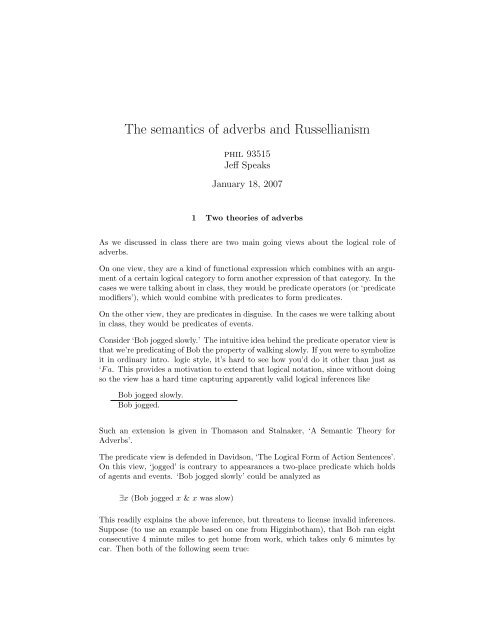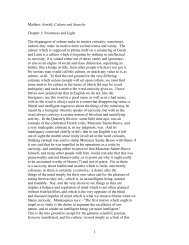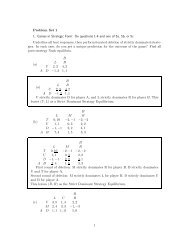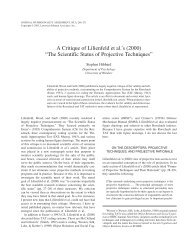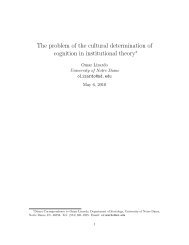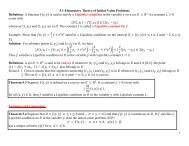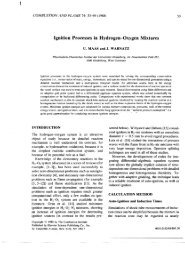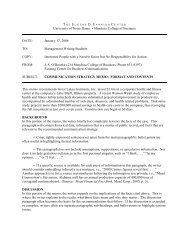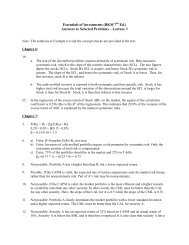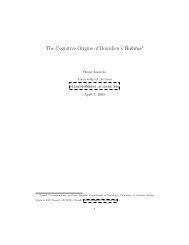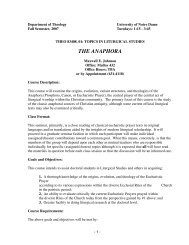The semantics of adverbs and Russellianism
The semantics of adverbs and Russellianism
The semantics of adverbs and Russellianism
Create successful ePaper yourself
Turn your PDF publications into a flip-book with our unique Google optimized e-Paper software.
<strong>The</strong> <strong>semantics</strong> <strong>of</strong> <strong>adverbs</strong> <strong>and</strong> <strong>Russellianism</strong>phil 93515Jeff SpeaksJanuary 18, 20071 Two theories <strong>of</strong> <strong>adverbs</strong>As we discussed in class there are two main going views about the logical role <strong>of</strong><strong>adverbs</strong>.On one view, they are a kind <strong>of</strong> functional expression which combines with an argument<strong>of</strong> a certain logical category to form another expression <strong>of</strong> that category. In thecases we were talking about in class, they would be predicate operators (or ‘predicatemodifiers’), which would combine with predicates to form predicates.On the other view, they are predicates in disguise. In the cases we were talking aboutin class, they would be predicates <strong>of</strong> events.Consider ‘Bob jogged slowly.’ <strong>The</strong> intuitive idea behind the predicate operator view isthat we’re predicating <strong>of</strong> Bob the property <strong>of</strong> walking slowly. If you were to symbolizeit in ordinary intro. logic style, it’s hard to see how you’d do it other than just as‘F a. This provides a motivation to extend that logical notation, since without doingso the view has a hard time capturing apparently valid logical inferences likeBob jogged slowly.Bob jogged.Such an extension is given in Thomason <strong>and</strong> Stalnaker, ‘A Semantic <strong>The</strong>ory forAdverbs’.<strong>The</strong> predicate view is defended in Davidson, ‘<strong>The</strong> Logical Form <strong>of</strong> Action Sentences’.On this view, ‘jogged’ is contrary to appearances a two-place predicate which holds<strong>of</strong> agents <strong>and</strong> events. ‘Bob jogged slowly’ could be analyzed as∃x (Bob jogged x & x was slow)This readily explains the above inference, but threatens to license invalid inferences.Suppose (to use an example based on one from Higginbotham), that Bob ran eightconsecutive 4 minute miles to get home from work, which takes only 6 minutes bycar. <strong>The</strong>n both <strong>of</strong> the following seem true:
Bob ran quickly.Bob commuted home slowly.<strong>The</strong>se would then be analyzed as∃x (Bob ran x & x was quick)∃x (Bob commuted x & x was slow)<strong>The</strong> worry is that Bob’s running home was the same event as his commuting home.So, it seems to follow that∃x (Bob ran x & x was quick & Bob commuted x & x was slow)from which it follows that∃x (Bob ran x & x was slow)i.e.,Bob ran slowly.which is false.It’s also important to note that cases <strong>of</strong> the above sort (‘<strong>adverbs</strong> <strong>of</strong> manner’) are notthe only sorts <strong>of</strong> expressions which appear to function like <strong>adverbs</strong>. Sometimes, e.g.,words which appear to be <strong>adverbs</strong>, like ‘seldom’ inCaesar seldom awoke before dawn.are really functioning as quantifiers. See Lewis, ‘Adverbs <strong>of</strong> Quantification’.2 A connection to Russellian <strong>semantics</strong>Russellians needn’t, per se, take any st<strong>and</strong> on these issues. <strong>The</strong> connection with<strong>Russellianism</strong> that I wanted to bring out was based on our discussion <strong>of</strong> the Russelliancontent <strong>of</strong> <strong>adverbs</strong>. (On the above options, it would be, respectively, a function fromproperties to properties <strong>and</strong> a property <strong>of</strong> events.) What I’m interested in is thefollowing argument against the view that <strong>adverbs</strong> have as their content second-orderproperties. In class we argued roughly as follows:2
Adverbs can’t express properties <strong>of</strong> properties since, if they did, ‘walkedslowly’ would be indistinguishable from the proposition expressed by‘Walking is slow’, which attributes the property <strong>of</strong> being slow to theproperty <strong>of</strong> walking. But ‘walked slowly’ doesn’t express a proposition byitself.<strong>The</strong> conclusion <strong>of</strong> this argument is correct — <strong>adverbs</strong> don’t express properties <strong>of</strong>properties — but it is important to see that the form <strong>of</strong> argument is not one whichcan be accepted by the Russellian. <strong>The</strong> argument relies on some principle like thefollowing:If you have a series <strong>of</strong> expressions e 1 . . . e n which express some proposition,<strong>and</strong> replace one <strong>of</strong> the expressions in the string with another expressionwith the same content, the resulting string <strong>of</strong> expressions shouldalso express a proposition.This will not, in general, hold, as Russell recognized in the Principles <strong>of</strong> Mathematics§52:“It is plain, to begin with, that the concept which occurs in the verbalnoun is the very same as that which occurs as verb. . . . <strong>The</strong> questionis: What logical difference is expressed by the difference <strong>of</strong> grammaticalform? . . . in regard to verbs, there is a further point. By transformingthe verb, as it occurs in a proposition, into a verbal noun, the wholeproposition can be turned into a single logical subject, no longer asserted,<strong>and</strong> no longer containing in itself truth or falsehood. But here too, thereseems to be no possibility <strong>of</strong> maintaining that the logical subject whichresults is a different entity from the proposition. ‘Caesar died’ <strong>and</strong> ‘thedeath <strong>of</strong> Caesar’ will illustrate this point. If we ask: What is asserted inthe proposition ‘Caesar died’? the answer must be ‘the death <strong>of</strong> Caesaris asserted.’ In that case, it would seem, it is the death <strong>of</strong> Caesar whichis true or false; <strong>and</strong> yet neither truth nor falsity belongs to a mere logicalsubject. <strong>The</strong>re appears to be an ultimate notion <strong>of</strong> assertion, given by theverb, which is lost as soon as we substitute a verbal noun, <strong>and</strong> is lost whenthe proposition in question is made the subject <strong>of</strong> some other proposition.This does not depend upon grammatical form; for if I say ‘Caesar diedisa proposition’, I do not assert that Caesar did die, <strong>and</strong> an element whichis present in ‘Caesar died’ has disappeared. Thus the contradiction whichwas to have been avoided, <strong>of</strong> an entity which cannot be made a logicalsubject, appears to have here become inevitable. This difficulty, whichseems to be inherent in the very nature <strong>of</strong> truth <strong>and</strong> falsehood, is onewith which I do not know how to deal satisfactorily.”Russell’s last example is not the best one to make the point. <strong>The</strong> more general worryis that if, as seems otherwise plausible, we take verbs <strong>and</strong> verbal nouns to have the3
same content, we can get a pair <strong>of</strong> strings <strong>of</strong> words which differ only in substitution<strong>of</strong> expressions which have the same content, one <strong>of</strong> which is true or false <strong>and</strong> theother <strong>of</strong> which does not even express a proposition, e.g.:Brutus kills CaesarBrutus killing Caesar.Two ways around this problem (which is a version <strong>of</strong> the problem <strong>of</strong> the unity <strong>of</strong> theproposition):• Say, with Russell, that there is some difference in content between these sentences— some ‘element’ <strong>of</strong> the first which is not an element <strong>of</strong> the second, <strong>and</strong>which somehow systematically evades being made the subject <strong>of</strong> a proposition.• Say that the difference between the two is a syntactic one. (This may be whatRussell denies when he says that it is ‘not a matter <strong>of</strong> grammatical form.’ Butthis seems to make syntax independent <strong>of</strong> <strong>semantics</strong> in a disturbing way.ReferencesDavidson, Donald, ‘<strong>The</strong> Logical Form <strong>of</strong> Action Sentences’, in: Rescher, Nicholas,editor, <strong>The</strong> Logic <strong>of</strong> Action <strong>and</strong> Decision, (Pittsburgh, PA: University <strong>of</strong> PittsburghPress, 1967).Lewis, David, ‘Adverbs <strong>of</strong> Quantification’, in: Papers in Philosophical Logic, (NewYork: Cambridge University Press, 1975/1998), pp. 5–21.Thomason, Richmond <strong>and</strong> Stalnaker, Robert, ‘A Semantic <strong>The</strong>ory for Adverbs’, LinguisticInquiry 4 (1973):195-220.4


